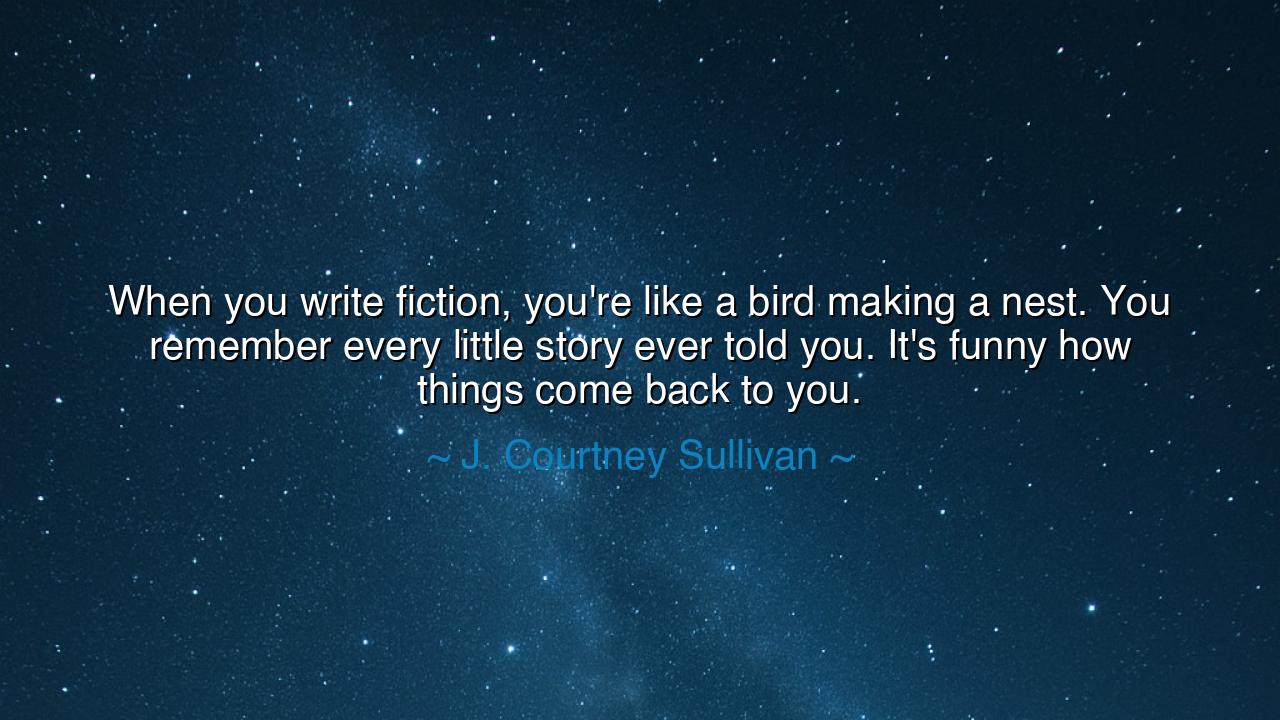
When you write fiction, you're like a bird making a nest. You
When you write fiction, you're like a bird making a nest. You remember every little story ever told you. It's funny how things come back to you.






When J. Courtney Sullivan said, “When you write fiction, you're like a bird making a nest. You remember every little story ever told you. It’s funny how things come back to you,” she revealed one of the oldest truths about the creative spirit — that art is not born from nothing, but woven from the threads of memory. Her words speak to the mysterious process by which a storyteller gathers fragments of life — half-heard conversations, moments of tenderness, glimpses of sorrow — and builds from them something wholly new. Like a bird gathering twigs, leaves, and bits of shining thread, the writer takes what the world has given and arranges it into a place of beauty and refuge. In this, fiction becomes both a creation and a remembering — the art of shaping what once was into what might be.
The origin of this reflection lies in the nature of storytelling itself. Sullivan, known for her novels that capture the deep intricacies of human relationships, speaks from the experience of one who has lived among stories — both real and imagined. To her, writing is not an act of invention, but one of transformation. Every story a writer hears, every person they meet, every joy or loss they witness, becomes a part of their inner landscape. Over time, these fragments return — unbidden, yet glowing — and take their place in the nest of narrative. In saying, “It’s funny how things come back to you,” she acknowledges the strange generosity of memory, how even the smallest details of life, long forgotten by the conscious mind, return when called by the heart of creation.
This process is not new; it is as ancient as the first poet who sang by the fire. The Greeks believed that the Muse did not invent but remembered. To create was to recall the divine patterns already written in the soul. Thus, the artist was not a fabricator but a vessel — one who gathered what the gods and life itself had scattered. Likewise, the bird in Sullivan’s metaphor is both humble and sacred: it builds not from wealth or abundance, but from the overlooked and the discarded. A scrap of string, a feather, a bit of straw — these become the foundation of something living. So it is with the writer: the laughter of a friend, a childhood wound, a passing face on a train — all are materials for art, if the heart knows how to weave them together.
History, too, bears witness to this truth. Consider Marcel Proust, whose monumental work In Search of Lost Time was born from the spark of a single memory — the taste of a madeleine dipped in tea. That simple sensory recollection unfurled a universe within him, awakening a flood of forgotten impressions and emotions. From such fragments, he built a cathedral of human experience. Or think of Maya Angelou, whose poetry and prose were shaped from the remembered pain and triumph of her own life. Each of these artists, like Sullivan’s bird, gathered what time had scattered, turning memory into creation, and experience into wisdom.
Sullivan’s insight also reveals a mystical continuity between life and art. What we live is never lost — it only sleeps, waiting to return in another form. The stories told to us by our elders, the tales whispered in childhood, the myths we read by candlelight — all are stored within, shaping our way of seeing the world. When the writer sits before the blank page, it is these echoes that stir. It is as though the soul itself bends low to whisper, “Remember.” And in remembering, the writer becomes both the child who listened and the elder who now tells. Creation, then, is not a solitary act, but a conversation across generations, a sharing of wisdom carried through the long corridors of time.
Yet this truth extends beyond the writer’s craft. Every life, in its own way, is a nest of stories — built from what we have seen, heard, and endured. The builder may not always be conscious of the gathering, but the materials are there, waiting to form meaning. The funny thing, as Sullivan says, is that the past never truly leaves us. It returns in our dreams, in the choices we make, in the words we speak to others. To live consciously is to recognize this gathering within ourselves — to see how each encounter, each loss, each joy contributes to the story we are still writing with our days.
So, my children, take this teaching to heart: cherish your memories, for they are the raw material of your becoming. Do not dismiss the small stories you hear, the fleeting emotions you feel — for in time, they may return as wisdom, as art, or as understanding. Like the bird, build your nest from everything life offers — the smooth and the rough, the bright and the broken. Let nothing be wasted. For the heart that remembers with tenderness, and the mind that shapes with care, can transform even the most ordinary twigs of experience into something eternal.
Thus, as J. Courtney Sullivan reminds us, creativity is not an act of force, but of faith — faith that what we have lived has meaning, and that what we remember, even unconsciously, can become beauty again. Trust your memories, honor your stories, and know that in every fragment you carry lies the seed of creation. For just as the bird builds its nest to cradle life, so too does the writer — and indeed every human soul — build meaning from memory, that future generations may find shelter there.






AAdministratorAdministrator
Welcome, honored guests. Please leave a comment, we will respond soon